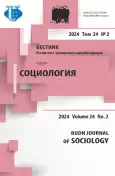Serbian students’ perception of the contemporary media coverage of critical situations
- 作者: Perić Romić R.1, Milošević Šošo B.2
-
隶属关系:
- University of Banja Luka
- University of East Sarajevo
- 期: 卷 24, 编号 2 (2024)
- 页面: 404-413
- 栏目: Contemporary society: the urgent issues and prospects for development
- URL: https://journal-vniispk.ru/2313-2272/article/view/323214
- DOI: https://doi.org/10.22363/2313-2272-2024-24-2-404-413
- EDN: https://elibrary.ru/PTPYWK
- ID: 323214
如何引用文章
全文:
详细
Since the very birth, the media has exerted a huge impact on masses, which only became more obvious in the contemporary information society, especially given the rapid development of technology and social networks. After a brief theoretical overview, the authors present the results of the sociological survey conducted in two public universities of the Republic of Srpska, which aimed at identifying student estimates of the mass media’s manipulative potential in general and student opinions towards the media coverage of the conflict between Russia and Ukraine in particular. The authors designed the survey sample in such a way as to represent students of social sciences and humanities (different educational profiles within these two professional fields) due to the very nature of their studies and to the better knowledge of issues under study by definition (content of courses and requirements to competences in the future professional field). The survey was conducted online, the questionnaire was posted on the Google platform, which allowed not only to share the link but also to receive feedback. The authors wanted to get empirical data proving the fact that the media has a significant influence on the formation of attitudes and value systems of the wider public, including the younger generation represented by the student youth. Given that the Russian-Ukrainian conflict has lasted for more than two years, it allows to get a deeper insight into the public perception of such critical issues as not just based on the media coverage or the first emotional reactions after the outbreak of the conflict. The authors wanted to know whether students feel/believe that the media (in general or specific media companies) tend to biased reporting, and what media channels students prefer to get much-needed information. The authors emphasize the need for objective reporting in crisis situations, including various conflicts. Crisis situations are always a great challenge for any media in the perspective of complying with ethical standards of reporting and the pressure of media owners and political forces. The article aims at revealing students’ attitudes towards the causes of such biased reporting and topics that the media is likely to cover in an objective manner.
作者简介
R. Perić Romić
University of Banja Luka
编辑信件的主要联系方式.
Email: ranka.peric-romic@fpn.unibl.org
доктор социологических наук, декан факультета политических наук Bulevar vojvode Petra Bojovica 1A, 78000, Banja Luka, Republic of Srpska
B. Milošević Šošo
University of East Sarajevo
Email: milosevic_biljana@yahoo.com
доктор социологических наук, профессор кафедры социологии философского факультета Vuka Karadžića 30, 71126 Lukavica, East Sarajevo, Republic of Srpska
参考
- Baran S.J., Davis D.K. Mass Communication Theory: Foundations, Ferment, and Future. Boston; 2012.
- Barović V. Objectivity, journalistic ethics and reporting in crisis situations. Medijske Studije. 2010; 2 (3-4). (In Serbian).
- Bogdanić A. Journalistic Discourse and Media Theory. Introduction to Theories of Journalism. Banja Luka; 2016. (In Serbian).
- Chong D., Druckman J. Framing theory. Annual Review of Political Science. 2004; 10.
- Cottle S. Global Crisis Reporting: Journalism in the Global Age. Maidenhead; 2009.
- Čerina J. War reporting in the context of contemporary armed conflicts and new media technologies. Polemos. 2012; 15. (In Serbian).
- Čomski N. Media Control. Novi Sad-Beograd; 2009. (In Serbian).
- Čomski N. What Does America Really Want? Beograd; 1999. (In Serbian).
- DeFleur M.L., DeFleur H.M. Mass Communication Theories: Explaining Origins, Processes, and Effects. New York; 2022.
- Giddens A. Sociology. Beograd; 2007. (In Serbian).
- Ivanković A. Students’ Perception of the Media Manipulation. Sveučilište u Zagrebu; 2022. (In Croatian).
- Jurčić D. Theoretical assumptions about the media: Definitions, functions and influence. Mostariensia. 2017; 21 (1). (In Croatian).
- Koković D. Society and Media Challenges: An Introduction to Sociology of Mass Communication. Novi Sad; 2007. (In Serbian).
- Malović S., Ricchiardi S., Vilović G. Ethics of Journalism. Zagreb; 2007. (In Croatian).
- McCombs M., Valenzuela S. Setting the Agenda: Mass Media and Public Opinion. Cambridge; 2021.
- Nadžaković E., Hromić B. Manipulation: The key to defeat the ‘quasi-master of the world’. In Medias Res. 2017; 6 (10). (In Croatian).
- Roskos-Ewoldsen D.R., Roskos-Ewoldsen B., Carpentier F.R.D. Media priming: A synthesis. Media Effects: Advances in Theory and Research. 2002; 2.
- Sokolović H. The Influence of the Media on the Creation of Political Attitudes and Values. Univerzitet u Sarajevu; 2018. (In Croatian).
- Šušnjić Đ. Fishermen of Human Souls: The Idea of Manipulation and Manipulation of Ideas. Beograd; 2007. (In Serbian).
- Šuvaković U.V., Narbut N.P., Trotsuk I.V. The youth of Russia and Serbia: Social trust and key generational problems. RUDN Journal of Sociology. 2016; 16 (4).
- Trotsuk I. “To trust or not to trust” is not the question; “How to study trust” is much more challenging task. Russian Sociological Review. 2016; 15 (4).
- Trotsuk I. Eschatological conspiracy theories: Models and ways for identifying apocalyptic semantics and syntax. Russian Sociological Review. 2023; 22 (4).
- Trotsuk I.V Discursive construction of social reality: Conceptual foundations and empirical devices for unmasking the ‘abominable’ practices. Russian Sociological Review. 2014; 13 (2). (In Russ.).
- Trotsuk I.V. Symbolic protest: Hidden messages and addressers. RUDN Journal of Sociology. 2017; 17 (3).
- Trotsuk I.V., Il`yina V.V. Hidden meanings in evaluation of social advertising efficiency: Methodological approach. Communicology. 2020; 8 (4). (In Russ.).
- Trotsuk I.V., Subbotina M.V. Assessment of cinematographic influence on social representations of heroism: Approbation of an approach. Communicology. 2018; 6 (4). (In Russ.).
- Wagner M.W., Gruszczynski M. When framing matters. How partisan and journalistic frames affect individual opinions and party identification. Journalism &Communication Monographs. 2016; 18.
- Weiss D. Agenda-setting theory. U.S.W. Littlejohn, K.A. Foss (Eds.). Encyclopedia of Communication Theory. Thousand Oaks; 2009.
补充文件









